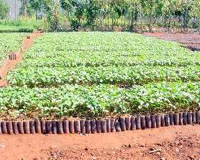 |
Palo Alto CA (SPX) Apr 19, 2011 Brazilians are world leaders in using biofuels for gasoline. About a quarter of their automobile fuel consumption comes from sugarcane, which significantly reduces carbon dioxide emissions that otherwise would be emitted from using gasoline. Now scientists from the Carnegie Institution's Department of Global Ecology have found that sugarcane has a double benefit. Expansion of the crop in areas previously occupied by other Brazilian crops cools the local climate. It does so by reflecting sunlight back into space and by lowering the temperature of the surrounding air as the plants "exhale" cooler water. The study is published in the 2nd issue of Nature Climate Change, posted on-line April 17. The research team,* led by Carnegie's Scott Loarie, is the first to quantify the direct effects on the climate from sugarcane expansion in areas of existing crop and pastureland of the cerrado, in central Brazil. The researchers used data from hundreds of satellite images over 733,000 square miles-an area larger than the state of Alaska. They measured temperature, reflectivity (also called albedo), and evapotranspiration-the water loss from the soil and from plants as they exhale water vapor. As Loarie explained: "We found that shifting from natural vegetation to crops or pasture results in local warming because the plants give off less beneficial water. But the bamboo-like sugarcane is more reflective and gives off more water-much like the natural vegetation. It's a potential win-win for the climate-using sugarcane to power vehicles reduces carbon emissions, while growing it lowers the local air temperature." The scientists found that converting from natural vegetation to crop/pasture on average warmed the cerrado by 2.79 degrees F (1.55 degrees C), but that subsequent conversion to sugarcane, on average, cooled the surrounding air by 1.67 degrees F (0.93 degrees C). The researchers emphasize that the beneficial effects are contingent on the fact sugarcane is grown on areas previously occupied by crops or pastureland, and not in areas converted from natural vegetation. It is also important that other crops and pastureland do not move to natural vegetation areas, which would contribute to deforestation. So far most of the thinking about ecosystem effects on climate considers only impacts from greenhouse gas emissions. But according to coauthor Greg Asner, "It's becoming increasingly clear that direct climate effects on local climate from land-use decisions constitute significant impacts that need to be considered core elements of human-caused climate change."
Share This Article With Planet Earth
Related Links Carnegie Institution Bio Fuel Technology and Application News
 Biofuel From Jatropha Plant Proving Its Worth As Aviation Fuel
Biofuel From Jatropha Plant Proving Its Worth As Aviation FuelLos Angeles CA (SPX) Apr 15, 2011 Business Matchmaking has compiled the results of multiple airline tests of oil from the little known non-edible plant Jatropha as a potential substitute for traditional jet fuel with impressive results. The non-profit company specializes in matching small firms with government agencies and major corporations. Japan Airlines, Air New Zealand, Continental, Brazil's TAM Airlines and most rece ... read more |
|
| The content herein, unless otherwise known to be public domain, are Copyright 1995-2010 - SpaceDaily. AFP and UPI Wire Stories are copyright Agence France-Presse and United Press International. ESA Portal Reports are copyright European Space Agency. All NASA sourced material is public domain. Additional copyrights may apply in whole or part to other bona fide parties. Advertising does not imply endorsement,agreement or approval of any opinions, statements or information provided by SpaceDaily on any Web page published or hosted by SpaceDaily. Privacy Statement |